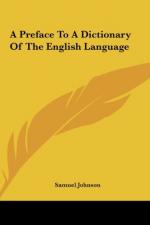For the Teutonick etymologies, I am commonly indebted to Junius and Skinner, the only names which I have forborn to quote when I copied their books; not that I might appropriate their labours or usurp their honours, but that I might spare a perpetual repetition by one general acknowledgment. Of these, whom I ought not to mention but with the reverence due to instructors and benefactors, Junius appears to have excelled in extent of learning, and Skinner in rectitude of understanding. Junius was accurately skilled in all the northern languages. Skinner probably examined the ancient and remoter dialects only by occasional inspection into dictionaries; but the learning of Junius is often of no other use than to show him a track by which he may deviate from his purpose, to which Skinner always presses forward by the shortest way. Skinner is often ignorant, but never ridiculous: Junius is always full of knowledge; but his variety distracts his judgment, and his learning is very frequently disgraced by his absurdities.
The votaries of the northern muses will not perhaps easily restrain their indignation, when they find the name of Junius thus degraded by a disadvantageous comparison; but whatever reverence is due to his diligence, or his attainments, it can be no criminal degree of censoriousness to charge that etymologist with want of judgment, who can seriously derive dream from drama, because life is a drama, and a drama is a dream? and who declares with a tone of defiance, that no man can fail to derive moan from [in greek], monos, single or solitary, who considers that grief naturally loves to be alone. [Footnote: That I may not appear to have spoken too irreverently of Junius, I have here subjoined a few Specimens of his etymological extravagance.
Banish. religare, ex banno vel territorio exigere, in exilium agere. G. bannir. It. bandire, bandeggiare. H. bandir. B. bannen. AEvi medii s criptores bannire dicebant. V. Spelm. in Bannum & in Banleuga. Quoniam vero regionum urbiumq; limites arduis plerumq; montibus, altis fluminibus, longis deniq; flexuosisq; angustissimarum viarum anfractibus includebantur, fieri potest id genus limites ban did ab eo quod [word in Greek] & [word in Greek] Tarentinis olim, sicuti tradit Hesychius, vocabantur [words in Greek], “obliquae ac minime in rectum tendentes viae.” Ac fortasse quoque huc facit quod [word in Greek], eodem Hesychio teste, dicebant [words in greek] montes arduos.
Empty, emtie, vacuus, inanis. A. S. AEmtiz. Nescio an sint ab [word in Greek] vel [word in Greek]. Vomo, evomo, vomitu evacuo. Videtur interim etymologiam hanc non obscure firmare codex Rush. Mat. xii. 22. ubi antique scriptum invenimus [unknown language]. “Invenit cam vacantem.”
Hill, mons, collis. A. S. hyll. Quod videri potest abscissum ex [word in Greek] vel [word in Greek]. Collis, tumulus, locus in plano editior. Hom. II. b. v. 811, [words in Greek]. Ubi authori brevium scholiorum [ words in Greek].




